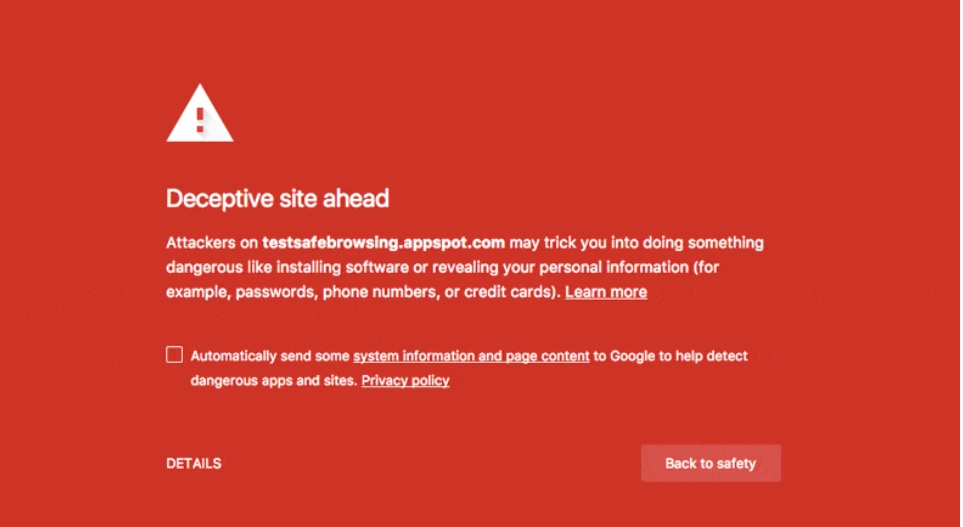Disaster recovery for recovery of Google rankings.

Losing hard earned Google rankings can cause any business owners world to spin!
Disappeared form the top 100 or the first page unexplainably with not a trace to be found?
Causes of losing rankings could be a drastic change in links or aa hack on your site.
If you see this picture when you are searching for your site, then a hack might unfortunately be the case.
Troubleshoot:
Firstly: check whether the drop is actually real/ and whether it fits in with the general trend or not. Has organic traffic dropped, and is this significant when looking at the overall traffic over a few weeks.
Is there a physical reason why this particular page has dropped eg over a holiday period.
Check the Google Console on whether it shows a similar rankings drop by checking whether there are still clicks on the site.
Secondly: did Google update their algorithm, check out sites which monitor this such as
- MozCast
- Searchengineland.com
An updated algorithm, means updating your approach to SEO.
Find out if the updated algorithm has introduced new penalites
Have things changed on the website which mighthave influenced rankings
Did the URL change of the website, as this will drop your rankings radically and act as unique identifiers for Google.
Has the site navigation changed recently? Check your:
- Menu navigation
- Side bar navigation
- Footer links
- Product links
- Blog posts
Check whether links have been changed or updated to your key pages:
- Index/Home page
- Category pages and menu
- Blogs/posts and articles
Have target keywords/phrases been changed.
Check the Google Search Console for server and crawl reports to find out if Google can still access your site
Has your site been blacklisted or received penalties from Google?
Manual search penalty:
These are given by human viewers where they feel your site is not complying with webmaster guidelines regarding quality and content.
This could be because your site has been hacked, has useless/thin/irrelevant content, backlinks which are unusual or to unusual sites, cloaking or has been hacked.
When doing a search for your website, it will show

A Google penalty gets placed on sites which have too many keywords, irrelevant keywords or black hat SEO. To find out whether there is a Google penalty on your website, log into your Google console account
- Click on Search Traffic,
- Manual Actions
There will be a notice here should you have a penalty.
- Thin content – content is duplicated on another site. Quality guidelines for content include not using automatically generated content. This means the content makes sense and is relevant. Avoid irrelevant keywords. Check whether the content is unique by going to http://www.copyscape.com/, or take some of the content an use it to search on Google.
- Cloaking – Cloaking is a violation of the webmaster guidelines, where different URLs or content are given than what the user expected eg Images which are set on top of html.
- Unnatural links
- Sneaky redirecting of links – this is when the user requests one thing and ends up on a different, redirected site.
- User generated Spam
Troubleshoot Google penalty causes:
Identify the cause according to the penalty notice and fix the problem.
Prevent a hack:
Thousands of websites are hacked daily, and maybe invisible to users, but they cause harm to your site and could cause it to be ultimately removed from Google.
Hackers could add code to hurt the site, or use it to steal confidential information
How to prevent SPAM
Protect your inbound access:
- Ensure all email links are java script protected
- Ensure you have Captchas for forms. Captchas require a human to add in information which a robot/computer virus does not. Captchas come in various forms which might need the user to add in a random selection of letters or numbers or identify certain objects in a picture.
- Use guestbooks and comments sections in moderation.
- Anti Spam tools include: Captchas and Spam plugins
- Use “nofollow” tags. This will created your page to not be included in page ranking, but for a hacked site it will deter hackers.
- For pages allowed to create profiles, forum threads or websites, SPAM can be avoided by preventing untrusted content
How to use a blacklist to prevent repetitive spamming attempts
Use your support team or trusted people to regularly check your site for spam attempts. For istes using comments section, consider using “noindex robots” meta tages on posts until they have proved themselves to be trusted users.
Use Google Alerts which is a tool to monitor the site for spam content (https://www.google.com/alerts)
My information from Google says I should rank differently to what is showing on the search:
- Check links and pop-ups which increase the bounce rate – change pop-ups wording or use different types such as timed pop-ups, Scroll pop-ups, Exit pop-ups and banners
- Check the response time of the page
- Page title can improve or destroy your ratings
- Perhaps there is valid competition which has affected your rankings, because they are doing better......











